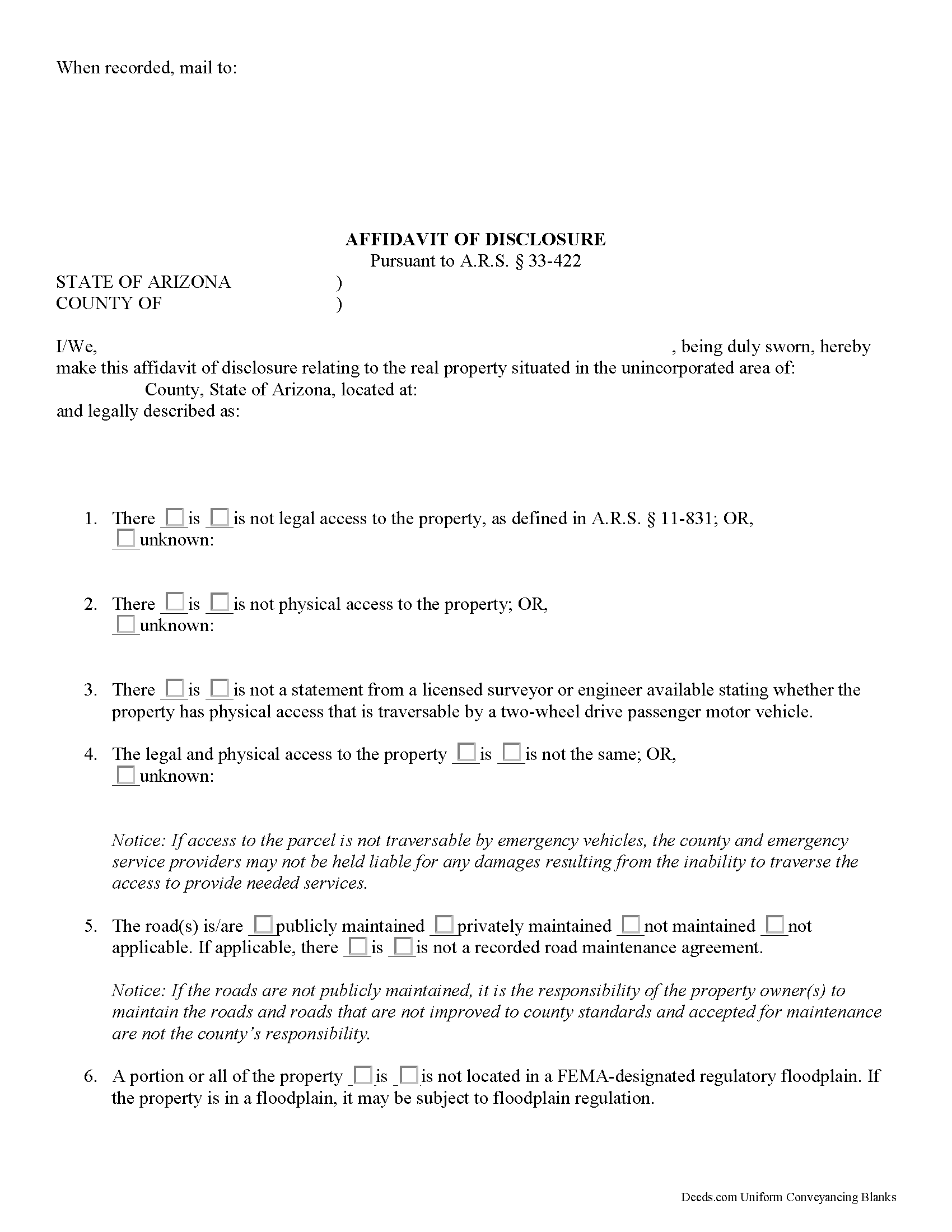Download Arizona Affidavit of Disclosure Legal Forms

Arizona Affidavit of Disclosure Overview

Before a transfer of real property is finalized, Arizona law requires the seller to disclose material facts about the relevant property to the buyer in a seller's disclosure report.
In Arizona, sellers of five or fewer parcels of improved or unimproved land located in an unincorporated part of a county (any area with no formally organized municipal government), must furnish buyers, in addition to any seller disclosure documents, another document called an affidavit of disclosure, under A.R.S. 33-422. The seller uses the affidavit to disclose additional material facts about the property subject to the pending conveyance. The seller is liable for omissions or misrepresentations made within the affidavit, which contains statements made under oath by the seller in the presence of a notary public or other official qualified by the State of Arizona.
By statute, the seller must provide the written disclosure to the buyer at least seven days prior to the transfer of property ( 33-422(A)). The buyer is then required to acknowledge receipt of the affidavit, and has the right to rescind the transaction up to five days after receiving the disclosure ( 33-422(D)). The affidavit is recorded alongside the deed of transfer in the office of the recorder in the appropriate county. Subsequent sellers of the property are also required to execute and record an affidavit of disclosure; any subsequent affidavit replaces a prior affidavit of record.
The form alerts buyers to some unique circumstances often associated with purchasing rural, unincorporated land in Arizona. For instance, the affidavit acknowledges whether there is legal access and physical access to the property. This disclosure allows the buyer to know beforehand if the necessary easements are in place to allow the buyer to legally access the property without issue, and whether any existent physical access to the property is lawful.
The affidavit also affirms relevant facts such as road maintenance, location on a FEMA-designated floodplain, existence of fissures or expansive soils, services provided to the property, water supply, wastewater treatment, and zoning, among others. The seller is also obligated to disclose any encumbrances due to pending legal action that may be attached to the property title.
Parts of the disclosure also serve as a general notice to the buyer: for example, a service provider is not liable for damages resulting from inaccessibility to the property in the case of an emergency. To complete the form, sellers may need to reference additional statutes pertaining to land divisions, maps designating military airports or facilities (available through the Arizona Department of Real Estate website), or other resources, as needed.
Seller and subsequent seller do not include a trustee of a deed of trust who is selling property by a trustees sale pursuant to title 33, chapter 6.1 or any officer who is selling property by execution sale pursuant to title 12, chapter 9 and title 33, chapter 6. If the seller is a trustee of a subdivision trust as defined in section 6-801, the disclosure affidavit required by this section shall be provided by the beneficiary of the subdivision trust.
Nondisclosures, whether intentional or accidental, can have significant legal consequences. Consult a lawyer with specific questions about the affidavit of disclosure or other inquiries relating to real estate transactions in Arizona.